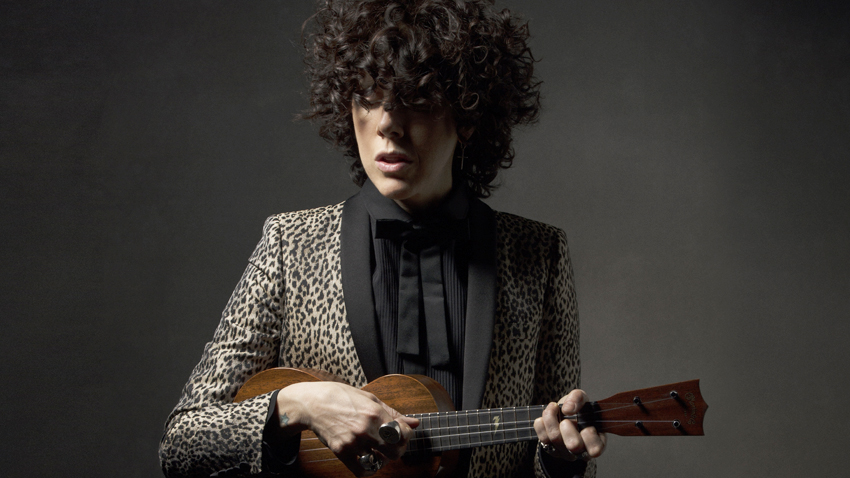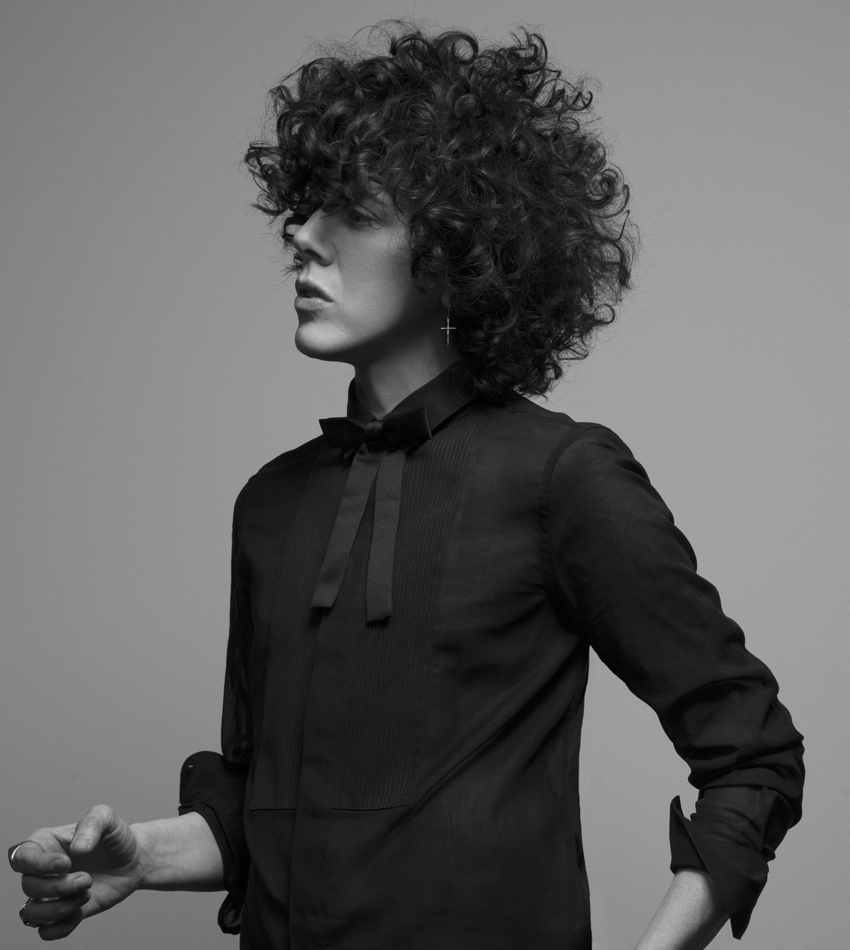
Want all the hottest music and gear news, reviews, deals, features and more, direct to your inbox? Sign up here.
You are now subscribed
Your newsletter sign-up was successful
From the Good Things Come To Those Who Wait Department, witness Laura Pergolizzi, or LP as she is professionally known. After releasing a pair of critically acclaimed albums (2001's Heart-Shaped Scar and 2004's Suburban Sprawl & Alcohol), the New York-born singer-songwriter took a step back from performing and launched a successful side career writing for Rihanna, Christina Aguilera and The Backstreet Boys, among others, before signing with Warner Bros. in 2012.
"I always knew that I would make another record of my own," LP says, "but I wanted to make sure that I was at the right label and that all of the pieces were in place. I had a publishing deal and I was getting paid to write, so I just figured, 'OK, that's what I'll do now. I'll be back on my own soon.'"
The Next Big Thing drumbeats are starting to be heard for LP's Warner Bros. debut, Forever For Now, but for once the hoopla feels justified. Produced by ace track-record guy Rob Cavallo (Green Day, My Chemical Romance, Dave Matthews Band), the album is a wondrous collection of instantly catchy and emotionally resonant songs crafted around the sounds of LP's distinctive, robust voice and her soon-to-be signature blend of acoustic guitar, ukulele and wistling.
LP sat down with MusicRadar recently to talk about her career bumps in the road, writing for other artists and the joys of whistling. (LP's Forever For Now will be released on June 3. You can pre-order the album at iTunes.)
Even though you were having success as a writer during that long gap between albums, were you ever dispirited at times?
"I mean, not really. There were ups and downs, sure, but enough things kept happening to give me hope. I'd get an indie deal, and that would lead to a major deal; I just kept getting deals. In a 10-year-period, I got five different deals of the record kind and the publishing kind. Plus, I was making money, so that kind of convinced me that I wasn't crazy to keep pursuing this dream. Everybody's got their challenges, and even though I wasn't doing as well as some people, I was doing better than a lot of others. I was writing music and staying afloat. I can't complain."
Into The Wild was featured in a CitiBank spot in 2012. Did you have any concerns about having that track out there so far in advance to the album?
Want all the hottest music and gear news, reviews, deals, features and more, direct to your inbox? Sign up here.
"No, not really. I found out that I got the commercial almost simultaneously with Warner Brothers signing me. I was asked to submit the song, but I didn't know what would happen. We were all surprised when it happened - me and Warner Brothers. It was funny, through: When my publisher sent me the spot, it didn't even have the song's chorus in it; it only had the "somebody left the gate open" piece. I didn't understand that, but hey, it got people talking. People started asking what the song was."
During the in-between album years, you wrote for a lot of people - Cher, Joe Walsh…
"Yeah, I've written for Rita Ora, I've written for Chiddy Bang - there's been a few. Rihanna's big cut."
Would you write for specific artists, or did the songs just happen to get picked up?
"Usually, the songs got picked up. Rihanna I wrote for. Christina Aguilera I wrote for - that was for the movie Burlesque. Sometimes I write for the person, sometimes I don't - it all depends. With Joe Walsh, that was kind of random. I'd written Hi-Roller Baby for myself while I was at Island/Def Jam; literally, four years later it got cut. Songs can be around for a long time."
The new album feels like classic pop-rock. It doesn't sound like somebody trying to chase the today's charts per se.
"I hear you. There's a classic-ness to it, I guess, or whatever you call it. But I didn't try to fit in with anything; the goal was just to be me. When I made the record, sure, there was EDM - that's been going on for a while - but there was all this other stuff like the Lumineers and Mumford And Sons. But I wasn't really listening to anybody and going, 'Oh, OK, I've gotta do this…' I think anybody can be influenced by what's around them, but a lot of times their version of what they hear is nothing like what that other thing was."
What was it like working with Rob Cavallo?
"Awesome. He's a really talented guy; he knows producing from the ground up - where to put a drum mic, how to record a vocal, all that stuff. Not every producer knows that sort of thing these days. I don't want to say that he's old school, but his knowledge is definitely pre-Pro Tools."

© Amanda Demme
What was your process for building the tracks up from your demos?
"We'd track drums first in a big studio, and then we'd build from there - bass, guitar, keys, voice, some strings. I don't make crazy demos. A lot of times it's drum machine, ukulele, guitar, vocal and maybe a fake string part."
Ukulele is on a couple of songs. You're a fan.
"I am. [Laughs] I was using the uke a lot as a songwriter, and then when I went back to being a songwriting, it just kind of stayed with me. I like it a lot."
You collaborated with some other writers for your record. Is the songwriting process any different when you're the one who's singing the songs? Who starts the idea?
"With my stuff, 90 percent of the time it's my titles and my words. We'll sit down and start with ukulele or guitar, or it could be a drum sound; somebody might hit a key and that sparks an idea. I like to mix it up. I'll come up with melodies and off we go."
Guitar-wise, who are your influences? Did you spend a lot of time studying anybody in particular?
"You know, not really. I just banged the guitar around until something halfway decent came out of it. I can't say, like, 'Oh, definitely Kurt Cobain,' or 'Yeah, it was all Jeff Buckley.' They were such ridiculously good guitar players. I like a lot of acoustic players, and I like The Beatles. I would try to bang out John Lennon's style of guitar playing, more of a rhythm thing."
But you are the first female Martin Guitar Ambassador. What does that entail?
"Well, actually, it's more to do with the ukulele for me. Martin makes ukuleles as well as guitars, so I was happy to get involved with them. I designed a uke with them, and they've been making me custom models for a few years now. They're really beautiful instruments."
A couple of your songs feature whistling - that's something you don't hear all the time.
"No, it's not. [Laughs] Sometimes that's my first melody attack when I'm writing. I'll play something on the uke and I'll whistle. It's a good, easy way to see if you have something, and it's just fun - it feels right. The way the whistling on the record happened, we were working on Into The Wild, and while we were listening back to some of the tracks, I just started whistling. The engineers turned around to me and were like, 'That's so cool. Why don't you get out there and record it?' Something so simple can get reactions."
What's your actual demoing process? And what's your home studio setup like?
"I'm usually in a studio. I do have a little setup at home. I use Pro Tools and a Neumann mic. Neumann's are my favorite. I don't have tons of equipment. Maybe one day I'll get more elaborate, but right now I keep it pretty basic."
Joe is a freelance journalist who has, over the past few decades, interviewed hundreds of guitarists for Guitar World, Guitar Player, MusicRadar and Classic Rock. He is also a former editor of Guitar World, contributing writer for Guitar Aficionado and VP of A&R for Island Records. He’s an enthusiastic guitarist, but he’s nowhere near the likes of the people he interviews. Surprisingly, his skills are more suited to the drums. If you need a drummer for your Beatles tribute band, look him up.
